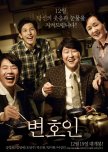This review may contain spoilers
About conscience & courage in a society that appears democratic, but is ruled by authoritarian force
He only wanted to do taxes. Draft contracts. Earn money. Song Woo-seok is a pragmatic lawyer — smart, efficient, unsentimental. But when the son of a woman who once trusted him in hard times is taken by the police, the man who once only saw paragraphs begins to see people. The Attorney tells the story of a man who thought he knew his place in the world — and only begins to truly live when he takes a stand.
Based on true events — the 1981 Burim case — the film follows the early journey of future president Roh Moo-hyun, without ever naming him. We witness a successful attorney becoming the defender of students branded as “communists,” tortured, and tried — simply for reading the wrong books at the wrong time. What unfolds is a courtroom drama that reverberates far beyond the trial itself: a story about conscience. About courage. And about the painful awakening in a society that appears democratic — but is ruled with authoritarian force.
Song Kang-ho, in one of his most compelling performances, carries the film with an intensity that makes anger, shame, and resolve palpable in every gesture. His transformation is moving precisely because it isn’t heroic — it’s hesitant, searching, deeply human. And it’s in this quiet where the power lies: when he rises and says, “I’m his attorney,” it isn’t a flourish — it’s a vow.
------------------------------ A historical side note: The long shadow of dictatorship ------------------------------------
In South Korea, the memory of Chun Doo-hwan’s authoritarian rule remains an open wound. The Burim case stands as a stark symbol of a time when civil rights existed only on paper — and disappeared into basements. The state’s orchestration of paranoia, the systematic torture of alleged dissidents, and the suspicion cast on intellectual life: The Attorney captures all of this with devastating simplicity.
And it shows: not all complicity comes from conviction. Some from fear. Others from habit. The film asks what it takes to break out of that cycle — and offers an answer that’s not political, but personal: empathy.
A major box office hit with over 11 million viewers, “The Attorney” is a landmark of Korea’s cinematic reckoning with its past. It reminds us that justice is more than a system — and that sometimes, justice begins with a single line: “I’ll take the case.”
Based on true events — the 1981 Burim case — the film follows the early journey of future president Roh Moo-hyun, without ever naming him. We witness a successful attorney becoming the defender of students branded as “communists,” tortured, and tried — simply for reading the wrong books at the wrong time. What unfolds is a courtroom drama that reverberates far beyond the trial itself: a story about conscience. About courage. And about the painful awakening in a society that appears democratic — but is ruled with authoritarian force.
Song Kang-ho, in one of his most compelling performances, carries the film with an intensity that makes anger, shame, and resolve palpable in every gesture. His transformation is moving precisely because it isn’t heroic — it’s hesitant, searching, deeply human. And it’s in this quiet where the power lies: when he rises and says, “I’m his attorney,” it isn’t a flourish — it’s a vow.
------------------------------ A historical side note: The long shadow of dictatorship ------------------------------------
In South Korea, the memory of Chun Doo-hwan’s authoritarian rule remains an open wound. The Burim case stands as a stark symbol of a time when civil rights existed only on paper — and disappeared into basements. The state’s orchestration of paranoia, the systematic torture of alleged dissidents, and the suspicion cast on intellectual life: The Attorney captures all of this with devastating simplicity.
And it shows: not all complicity comes from conviction. Some from fear. Others from habit. The film asks what it takes to break out of that cycle — and offers an answer that’s not political, but personal: empathy.
A major box office hit with over 11 million viewers, “The Attorney” is a landmark of Korea’s cinematic reckoning with its past. It reminds us that justice is more than a system — and that sometimes, justice begins with a single line: “I’ll take the case.”
Was this review helpful to you?


 10
10 41
41 15
15





















